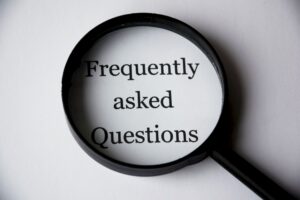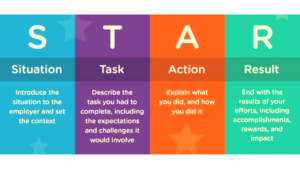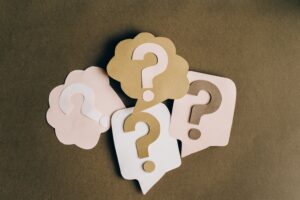Job interviews are stressful. You are put under pressure, tested, and subjected to a variety of employment interview questions. The interviewer may attempt to catch you off guard, and there are several pitfalls that candidates fall into.
However, understanding what to anticipate and taking a deliberate approach might place you in a favorable position and put you ahead of the competition. You’ve spent time crafting an excellent résumé; now it’s time to go and up your game.

Take the time to prepare before meeting with the recruiting team to boost your chances of a successful job interview. Consider the issues you are likely to cover, approaches to position yourself as a great applicant, and chances to impress the recruiting committee. In your job interview preparations, include the following:
Learn all you can about the organization and the role.
Plan ahead of time how you will dress and show yourself professionally.
Think about the best methods to tackle common interview questions.
Table of Contents
- How to Prepare for Successful Job Interview.
- Read the job description carefully.
- Evaluate Your Fit to the Job Requirement.
- Research the organization.
- Prepare your Answers to The Most Common Questions.
- Learn about the STAR technique.
- Dress Appropriately.
- Consider the questions you’d want to ask.
- Practice mock interviews.
- Make a plan for the day.
- Send a Thank You note.
How to Prepare for Successful Job Interview.
Here are things to remember as you prepare for a job interview:
Read the job description carefully.

Read the job description carefully to understand how the business has portrayed the role and the sort of applicant they want. Examine the keywords and key phrases used by the employer to explain their expectations. The more closely you can match your talents and credentials to the job description, the more likely you are to wow the interviewer. The job description may also provide some insight into the kind of questions the interviewer may ask.

Evaluate Your Fit to the Job Requirement.
After you’ve outlined your credentials for the position, build a list of your assets and match them to the job criteria.
Make a list of your strengths that correspond to the employment criteria. Skills, traits, certificates, experiences, professional credentials, talents, computer skills, and knowledge bases are examples of these. When explaining to the employer why you are an outstanding match for the position, you may bring up some of these strengths.
Consider examples from previous job experiences that demonstrate these attributes. This way, you’ll be prepared if the interviewer asks you to recount an instance when you displayed a certain talent or aptitude.
Research the organization.

The foundation of a good interview is doing your research about the company. Understanding the company and what they’re looking for can not only help you anticipate the interview questions they’ll ask, but will also give you a better idea of the responses they want to hear.
What knowledge do you have about the company? is a common initial job interview question for which you should be prepared. It will be embarrassing and make you seem incompetent or disinterested in the task if you do not have a thorough answer.
In any case, it conveys the message that you did not take the job interview seriously.
Most applicants will visit the company’s website, but the interview is not a test of your ability to read their website. Read articles about them online, view YouTube videos on the firm published by third parties, or videos of the company’s management. Examine their social media pages to see what message they are attempting to convey. What are they tweeting and posting? Is your background applicable to one of their current initiatives?
Prepare your Answers to The Most Common Questions.

Looking at the job description and the skills necessary for the work should give you an idea of what type of questions regarding your talents and experience could be asked. List the potential questions and make a note of your responses, but don’t worry about fitting into a certain box. The interview is an opportunity to demonstrate not just your knowledge and abilities, but also your personality, so personal projects you’ve made or examples from hobbies or interests that are relevant to the interviewer may be of interest. All of these items, taken together, will assist you explain why you are a good fit for the position.
Make a list of possible job interview questions and replies. Prepare to explain any gaps in your CV and why you left previous jobs. Examine the work criteria and come up with actual instances to illustrate these talents.
Matching the essential abilities in the job description to your expertise is a simple method to do this.
Aside from preparing responses to standard interview questions like “Tell me about yourself?” or “Why do you want to work here?” use the STAR approach to provide instances of how you’ve contributed value. What are your most remarkable achievements? How do they relate to the position you’re interviewing for? Do you have any instances of difficult circumstances you’ve conquered, such as dealing with conflict, working under pressure, or managing large projects? Spend many hours taking notes and preparing responses to all of the most frequent questions that are likely to be asked.
In addition to position-specific questions, consider including the following frequent questions on your list:
Please tell me about yourself.
Why are you seeking a new job?
Why do you want this position?
What are your greatest strengths and weaknesses?
What motivates you?
Where do you see yourself in the next 5 years? https://learnerra.com/job-interview-questions-and-answers/
Learn about the STAR technique.

Many hiring managers ask behavioral questions during job interviews to gauge how applicants handle typical workplace circumstances. Learn the STAR approach, which includes discussing the situation, task, action, and result, to prepare for these questions. To apply this strategy, first, establish the situation’s background before addressing your function or task under these conditions. Next, consider your response to the problem and the results of your effort.
Dress Appropriately.

What should you wear to a job interview? Plan an outfit that reflects the organization’s culture and demonstrates your professionalism. When in doubt, it’s better to overdress than underdress. However, if the company’s dress code is fairly casual, wearing a suit may seem excessively formal or “too corporate.” To find out what the dress code is, look for images of staff on their LinkedIn or Facebook accounts, or contact your recruiter. Whatever you select, it is critical that you seem clean and professional.
Wear as little jewelry as possible and keep your accessories to a minimum.
Consider the questions you’d want to ask.

Preparing for a job interview includes thinking about the correct questions to ask. Create intelligent interview questions based on your research that indicate a genuine interest in the job and the organization.
As an example:
What are the three most critical things you want me to do within my first six months at the organization if I’m hired?
What are the most difficult aspects of this job?
In addition, request clarification on anything you read or additional information about an interesting point. Creating dialogue makes the interview more interesting. And if anything fascinates you throughout the interview, make an effort to revisit it.
Practice mock interviews.

It is common to feel apprehensive and overwhelmed before an interview, no matter how well you prepare. Mock interviews may be quite beneficial in this aspect. They can simulate an interview setting and increase your confidence. Request your friends or relatives do a mock interview for you. Consider videotaping the whole procedure in order to analyze your performance. If you can’t find someone to play the interviewer, you may practice in front of a mirror.
Make a plan for the day.

The morning before the interview is not the time to learn the difference between Wilfred Street and Wilfred Avenue—or that your internet connection is insufficient to handle a video conference. Produce hard copies of your résumé and cover letter. Put all of your significant papers in a folder, including your mark sheets, certificates, ID proofs, and photos. If HR has requested you to bring any specific papers, such as wage stubs, a letter of resignation from your former job, or a bank statement, make sure you have those ready as well.
If your interview is in person, plan your route from home to the interview place in detail. A trip to the location a day or two before the interview will offer information regarding travel times, parking or bus stops, and construction. If you arrive early for the interview, look for a nearby coffee shop or park where you may wait.
If the interview is through phone or video, be sure your equipment is up to date, that your computer is operational, and that your internet connection is robust. Choose a peaceful location for the interview and keep all distractions to a minimum (turn off your computer, put away random objects on your desk, etc.). Also, ensure that your video conferencing login is operational. Technical difficulties might be unpleasant, and you should try to be as relaxed as possible before your interview.
Send a Thank You note.

After a job interview, send a thank-you message or email expressing your interest in the position.
Restate why you want the position, your credentials, how you believe you can make a big impact, and so on.
This thank-you letter is also an excellent time to highlight anything important that was missed during the interview and something that you definitely wanted to be highlighted.
This thank-you letter is also an excellent opportunity to highlight anything important that your interviewer did not ask or that you did not answer as extensively or as well as you would have wanted.
Best of luck!






